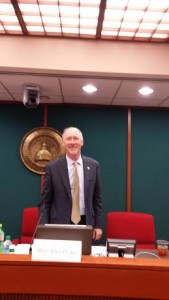Rep. Peake, Sen. Jones Introduce Cannabis-related Bills in Georgia
 (APN) ATLANTA — Two new bills, HB 722 and SB 254, will challenge Georgia’s antiquated cannabis, or marijuana, laws this year of the 2015-2016 Legislative Session.
(APN) ATLANTA — Two new bills, HB 722 and SB 254, will challenge Georgia’s antiquated cannabis, or marijuana, laws this year of the 2015-2016 Legislative Session.
As previously promised, State Rep. Allen Peake (R-Macon) filed HB 722, Peake’s new medical cannabis bill, which includes many of the model policies and practices reviewed by the medical cannabis commission during the hearings held in the summer of 2015.
The Commission ultimately voted against in-state cultivation in Georgia, after Gov. Nathan Deal said he opposed the idea; however, it is beginning to appear there is enough will in the Legislature to make Georgia a real medical cannabis state this year.
HB 722 will create a new patient registry, expand the list of qualifying conditions, dismantle the current low THC oil registry that was created by last year’s HB 1, and create in-state cultivation.
The bill allows regulated in-state cultivation, modeled after the State of Minnesota’s medical cannabis law that is the most restrictive in the country. It would create up to six state licensed, private companies to grow and produce the cannabis oil.
In-state growers have the technology to track and control the product from seed to sell. Peake and medical advocates hope this tight security will ease the fears of some law enforcement and Gov. Deal, who have opposed in-state cultivation.
Rep. Peake’s bill has the support of Georgia House Speaker David Ralston (R-Blue Ridge).
http://www.legis.ga.gov/Legislation/20152016/154191.pdf
This bill is necessary to provide a pathway legal under Georgia law for seriously ill people to obtain medical cannabis in Georgia.
It currently is a huge financial burden for many patients, and impossible for others, to travel out of state to buy the oil, which is what families needing medical cannabis currently must do. HB 1 provided them immunity in Georgia, but as they return to Georgia with the oil, Georgians are breaking federal law while crossing state lines.
HB 722 also expands the number of qualifying medical conditions to include Epidermolysis Bullosa, Tourette’s syndrome, Post-Traumatic Stress Disorder (PTSD), Intractable Pain, Autism spectrum disorder, Alzheimer’s disease.and Human Immunodeficiency Virus (HIV) or Acquired Immune Deficiency Syndrome (AIDS), terminal illness, and any other medical condition approved by the commission.
The bill aims to allow the Georgia Department of Public Health to make more decisions regarding medical cannabis.
The Commissioner will share medical research and recommendations about dosage for each qualifying condition and the full range of chemical compositions of the cannabis plant that will be medically beneficial for each qualifying medical condition.
Scientific researchers and medical professional are more qualified to make decisions about eligibility, dosage, and treatment, than elected officials and law enforcement officers who do not have medical training.
The current CBD/low THC oil is a one size fits all solution that is not realistic for other medical conditions that require different cannabinoid combinations, ratios, dosages, and delivery methods.
If passed, HB 722 will help more suffering and sick people have a better life, without the damaging effects of prescription narcotic drugs or fear of breaking the law.
The other bill, SB 254, filed by State Sen. Harold Jones (D-Augusta) ends felony prosecution for cannabis possession above one ounce.
http://www.legis.ga.gov/Legislation/20152016/154180.pdf
Georgia has more people in prison and under correctional supervision than any other place on Earth. A large percentage of that population is there for cannabis possession, and this bill would help reduce the school-to-prison pipeline that disproportionately affects Black youth in the U.S.
Polls continue to show the vast majority of Georgians support cannabis reform and decriminalization, especially for medical use.
(END/2016)
“Scientific researchers and medical professional are more qualified to make decisions about eligibility, dosage, and treatment, than elected officials and law enforcement officers who do not have medical training.”
It seems elected officials are increasingly willing to step aside and let medical doctors handle medical decisions regarding marijuana. The primary obstacle appears to be their fear of LEO. It’s hard, as an ordinary citizen, to feel a sense of safety and confidence in LEO when our elected officials exhibit fear regarding law enforcement. But perhaps my perception is skewed in some way?